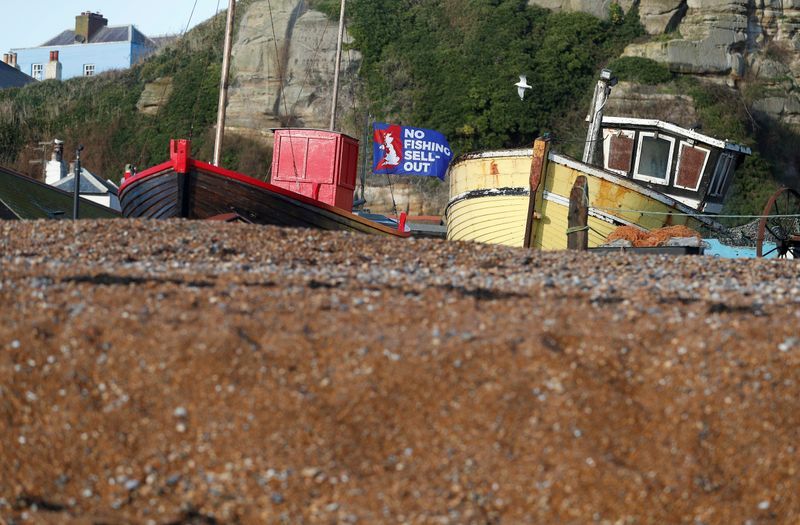NEWLYN, England, (Reuters) – For England’s fishermen, Prime Minister Boris Johnson’s Brexit trade deal is a betrayal because it allows some European Union boats continued access to Britain’s rich inshore coastal waters.
Johnson, who led the 2016 Brexit campaign, cast the Christmas Eve trade deal as a way to take back control of the United Kingdom’s destiny including as an “independent coastal state with full control of our waters.”
But in Newlyn, an ancient Cornish fishing port as far from London as Paris, there is anger that Johnson has let EU boats continue plying the rich 6-12 nautical mile inshore fishing zone.
“Boris the betrayer has slayed us and we won’t forget,” Phil Mitchell, the 51-year-old skipper of the 23-metre Govenek of Ladram, told Reuters aboard the boat. “We had the opportunity to actually take back control and we’ve passed it up.”
“They were happy to use us for their campaign and when push has come to shove, we’ve had the shove and we’ve been dumped on from a great height,” said Mitchell, a Brexit supporter who says a historic opportunity has been squandered yet again by leaders 290 miles (470 km) away in London.
From the boats in Newlyn, England’s biggest fishing port by tonnage landed, to the fishermen’s cottages perched above the harbour, the feeling of betrayal is all around.
The anger gives an insight into the motivations of the frenzied five-year Brexit crisis and the limits of the settlement that Johnson has tried to impose after the United Kingdom’s tempestuous 48-year liaison with the EU.
“We’ve been sold out,” said David Stevens, 46-year-old skipper of the 24.5 metre Crystal Sea twin-rig demersal trawler. “The most galling kick in the teeth for us is the continued access for EU vessels inside the 12-mile limit.”
“The industry was used as a pawn all the way through – held up as the reason to be leaving – yet they have thrown us under the bus,” said Stevens.
‘BREXIT BETRAYAL’
The cry of taking back control of British waters helped Brexiteers such as Johnson win the 2016 referendum in which 52 percent of the United Kingdom voted to leave.
For fishermen from Cornwall to Scotland, EU membership and the decline of fishing go hand in hand. They voted for Brexit in droves.
The United Kingdom’s fishing fleet has halved over the past 30 years to below 6,000 boats from more than 11,000. More than half of the UK fleet was built before 1991. The United Kingdom – surrounded by sea – is a net importer of fish.
The fishermen in Newlyn said they were betrayed by in 1973 when Conservative Prime Minister Edward Heath led the United Kingdom into the European project, and that they are being betrayed on the way out too.
“In 1973, Ted Heath, he sacrificed fishing to get the deal to go into Europe,” said Stevens, a Brexit supporter who fishes for lemon sole, ray and turbot. “Coming out of Europe, Boris has done the same, but it’s worse this time.”
Johnson’s deal with the EU secures British trade with the bloc free of tariffs and quotas on goods, vital for industries much larger than fishing. But fish were among the final issues to be hammered out, with the EU negotiating hard on behalf of politically influential coastal communities in France and other countries that have fished British waters for centuries.
Johnson said the deal increases the quota for British fishermen equal to 25% of the value of the EU catch in UK waters, and will be phased in over 5 years.
“I can assure great fish fanatics in this country, we will, as a result of this deal, be able to catch and eat quite prodigious quantities of extra fish,” Johnson said on Dec. 24 about the deal.
While the government has said some EU vessels will have access to some UK territorial waters for the 5-year adjustment period, fishermen said in practise EU boats will retain the rights forever.
Given the complexity of the deal texts, even maritime lawyers are uncertain of the full details. The agriculture ministry declined to immediately clarify the 12-mile limit rules.









